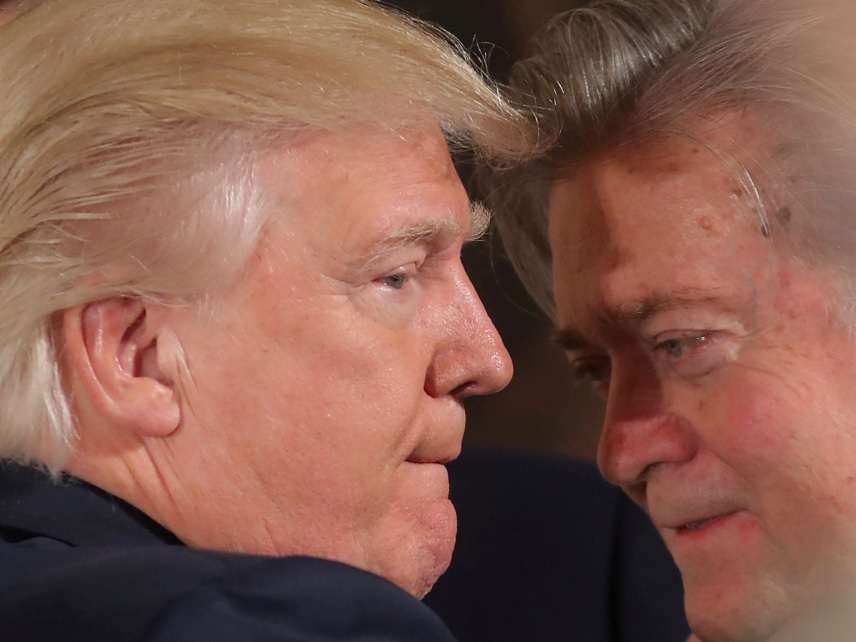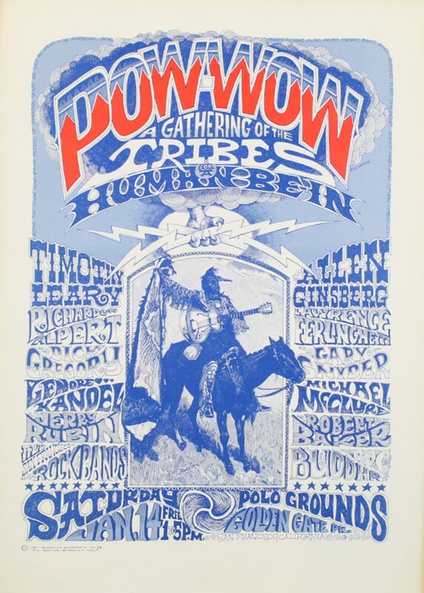Koch Bros. Should 'Shut Up and Get With [Trump's] Program,' Says Steve Bannon
Dismissed advisor attacks billionaire libertarians for pushing free trade and immigration. President calls them "total joke."

Back in San Francisco in 1967, there was an event that helped catalyze the "Summer of Love" and was variously billed as "Human Be-In" and "A Gathering of Tribes." It featured a variety of beat-hippie poets (Allen Ginsberg, Gary Snyder), popular area rock bands (such as the mostly forgotten Quicksilver Messenger Service), and Timothy Leary at peak guru-ness, proclaiming it was time to "turn on, tune in, and drop out."
The tribes included
leftovers from the North Beach Beat scene and Berkeley's antiwar protesters. It meant the Hells Angels and the flower children, and it meant impressionable high school teens and anybody on the cusp of either needing a haircut or deciding not to get one.
Organizers got lucky with the weather, which was sunny and unseasonably warm, conducive to bringing "family, animals, cymbals, drums, chimes, flutes, flowers, incense, feathers, candles, banners, flags," as one of the posters requested.
That was then, this is now.
Tribes these days are mostly political and you can leave the family animals, feathers, and flowers at home. Here's Steve Bannon, dismissed adviser to President Donald Trump, ranting about the Koch Brothers (Charles and David, both of whom contribute money to the nonprofit Reason Foundation that publishes this website, the latter being a longtime member of the board trustees) for insufficient loyalty to Fearless Leader:
"What they have to do is shut up and get with the program, OK?" Bannon said in an interview with Politico. "And here's the program: Ground game to support Trump's presidency and program, [and] victory on Nov. 6."
Bannon! How many divisions does he have these days? Well, here's Donald Trump himself, tweeting like a motherless child crying for his Maypo:
The globalist Koch Brothers, who have become a total joke in real Republican circles, are against Strong Borders and Powerful Trade. I never sought their support because I don't need their money or bad ideas. They love my Tax & Regulation Cuts, Judicial picks & more. I made…..
— Donald J. Trump (@realDonaldTrump) July 31, 2018
….them richer. Their network is highly overrated, I have beaten them at every turn. They want to protect their companies outside the U.S. from being taxed, I'm for America First & the American Worker - a puppet for no one. Two nice guys with bad ideas. Make America Great Again!
— Donald J. Trump (@realDonaldTrump) July 31, 2018
The Koch's sins are that they disagree with Trump on many issues, including criminal justice reform, trade, and immigration. They want more of it than the president and his supporters, who have managed in just a few years to utterly transform the GOP into the party of protectionists and xenophobes. It wasn't always this way, as anyone who remembers Ronald Reagan and George H.W. Bush can attest.

The president of the Charles Koch Foundation, Brian Hooks, puts it this way:
"The divisiveness of this White House is causing long-term damage," Brian Hooks, a senior Koch lieutenant, told reporters at the event. "When in order to win on an issue someone else has to lose, it makes it very difficult to unite people and solve the problems in this country. You see that on trade: In order to get to a good place on trade, convince the American people that trade is bad."
There's a reason why Donald Trump was able to win the presidency with 46 percent of the popular vote. Political tribalism, unlike its hippie counterpart, demands blind loyalty. Shut up and get with the program, as Steve Bannon puts it. But the tribe that Donald Trump and the Republican Party represent is growing smaller every day. The same holds true for Democrats as well. Each party has devolved into less-appealing clusters of incoherent special interests that, while being less representative of America in general demand even more unthinking loyalty. Go find a pro-choice Republican and a pro-life Democrat (these creatures once existed). Since when did believing in lower taxes mean you had to rage against millionaire football players for kneeling during the National Anthem? Or that allowing children brought here illegally by immigrant parents meant you had to support single-payer health care?
As Stanford political scientist Morris Fiorina told Reason earlier this year (full interview, transcript here):
"You have two parties in a heterogeneous country where people have all kinds of views….It's simply not enough to represent diversity in this country."
In his latest book, Unstable Majorities: Polarization, Party Sorting, and Political Stalemate, Fiorina argues that Americans actually agree with each other on fundamental issues such as immigration, marriage equality, and pot legalization. The polarization we hear about is mostly restricted to political activists and media elites who mistake their own extreme views for those of the common people.
"Everybody worries about the average American being ensconced in a filter bubble," says Fiorina. "Most of the research suggests it's the elites who are in these filter bubbles…and have this biased view of the world."
Steve Bannon's bubble was burst a year ago when Trump sent him packing from the White House but he has re-emerged as a vocal defender of his former (future?) boss. Trump's repudiation of the Kochs lays out neatly one of the most scurrilous forms of argument: You are not allowed to criticize a system by which you benefit. Via his tax cuts, he made the billionaire brothers richer, therefore they have no right to say anything critical about me and my tribe.
This way madness—and increasingly precarious electoral majorities—lies, whether we're talking Trump Republicans or socialist Democrats, who are espousing their own version of shut up and get with the program. The upside is that such purity tests and demands will, as Fiorina points out, drive ever-more people out of the political duopoly and swell the ranks of independents who already comprise a plurality of American voters. Change is coming, always too slow, but it's coming soon to a polling place near you. And it will reward politicians and parties with a coherent, positive message about decreasing the size, scope, and spending of government and increasing individual autonomy.
Parting video: Among the various songs that may have been inspired by the Human Be-In was The Byrds' elegiac "Tribal Gathering," from their 1968 LP The Notorious Byrd Brothers. Take a listen below:


Show Comments (133)